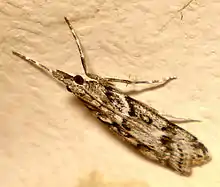Eudonia angustea
Eudonia angustea is a moth of the family Crambidae described by John Curtis in 1827. It is found in southern and western Europe, the Canary Islands, Madeira and Turkey.[1]
| Eudonia angustea | |
|---|---|
 | |
| Scientific classification | |
| Kingdom: | |
| Phylum: | |
| Class: | |
| Order: | |
| Family: | |
| Genus: | |
| Species: | E. angustea |
| Binomial name | |
| Eudonia angustea (J.Curtis, 1827) | |
| Synonyms | |
| |
The wingspan is 17–22 mm.The forewings are narrow, whitish, mixed with brownish and sprinkled with black; base darker; lines whitish, dark-edged, first oblique,second sinuate ; orbicular outlined with black ; claviform black, touching first line; a black X-shaped discal mark,upper half filled with light brownish ; subterminal line cloudy,whitish, hardly touching second. Hindwings are whitish-grey,terminally obscurely darker.The larva is blackish-grey, slightly greenish-tinged; spots darker or almost black ; head pale brown ; plate of 2 dark brown or almost black.[2]
Adults are on wing from July to late autumn.[3]
The larvae feed on mosses on walls and in sand dunes.
References
- "Eudonia angustea (Curtis, 1827)". Fauna Europaea. Retrieved March 4, 2018.
- Meyrick, E., 1895 A Handbook of British Lepidoptera MacMillan, London pdf
 This article incorporates text from this source, which is in the public domain. Keys and description
This article incorporates text from this source, which is in the public domain. Keys and description - "63.069 BF1342 Eudonia angustea (Curtis, 1827). UKMoths. Retrieved March 4, 2018.